Brands and entrepreneurs try to milk every engagement opportunity on the internet whether it’s through social media, email, or paid ads.
Why is that so? The ultimate behind all these attention-grabbing techniques is to convert the lead into a paying customer. After all, if marketing doesn’t lead to revenue, what’s the point, right?
Therefore, a lot of brainstorming and effort goes into achieving this goal. Marketers fine-tune UI/UX, A/B test colour schemes, enhance call-to-actions, optimize on-page SEO, and much more to make it happen.
However, there’s one crucial element that many marketers, bloggers, and small businesses often overlook: custom URLs.
This blog will cover what custom URLs are, best practices for creating them, and how to make one. By the end, you’ll have a clear understanding of their value in enhancing your brand’s online presence. Let’s dive in!
What are custom URLs?
Custom URLs are customized, better-looking, alternative URLs, that replace long and clunky website URLs for enhanced engagement, click-through rate, and conversion.
Custom URLs, also known as vanity URLs, play a pivotal role in digital marketing and SEO, yet they’re often overlooked. Many e-commerce websites miss out on optimizing their product page URLs, which can harm their SEO performance since URL structure significantly impacts search rankings.
Some brands, however, integrate branded, short URLs into their link management strategies to improve click-through rates (CTR) and conversions across different channels, including email newsletters, social media posts, and marketing materials.
Digital marketers and SEOs understand the importance of custom URLs in social media and SEO campaigns, often embedding targeted keywords within URL slugs to boost relevance and visibility.
You might have noticed that brands and influencers frequently use short URLs in their social media content, often with campaign-specific URL slugs. Unlike tracking parameters, these slugs are tailored for branding and messaging purposes.
Custom URLs benefit both branding and SEO efforts in digital marketing. By adding branded domains and creating unique short links, brands can strengthen their online presence across social media and email marketing campaigns.
Shorten your links, amplify your brand.
Create shareable, trackable and fully customizable branded urls. Get more clicks with absolute link management features such as Bio Links, retargeting, deep Links, CTA’s and more.
Learn More!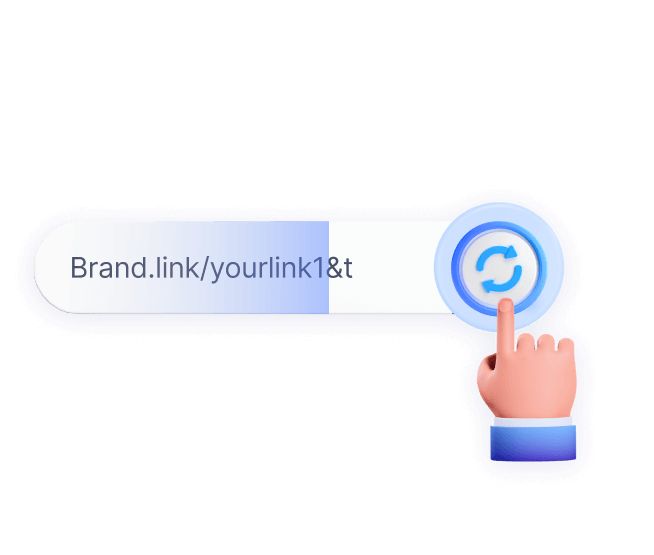
Best practices for using custom URLs
Have you ever wondered what goes into creating fancy and attractive custom URLs? Using vanity or custom URLs is a common digital marketing practice that helps brands build brand reputation and identity.
However, there are a few things to know before you create a bunch of custom URLs for a social media marketing campaign. Let’s discuss some of the best practices that will help you navigate the custom URL creation process with ease:
i. Use a short domain for custom URLs
There is no point in putting effort into setting up a custom URL with a long URL. A custom URL has to be short and sweet. Brands and entrepreneurs get creative with using the short versions of their names or finding the short domain extensions.
ii. Opt for a brandable custom domain
Your custom URL has to be relevant to your brand name so that it elevates your brand identity. Go for a custom domain that is either a short version of your brand name or using the initials of the company name. (Example: amzn.com)
iii. Register your domain with a short, relevant extension
Custom domains aren’t just about the domain names or URL slugs – the extensions matter too. A lot of brands use .io, .se, .co, and other short domain extensions for their custom URLs. However, it’s not the rule of thumb; you can go for .com or .net if you want to but, make sure that the domain name is short and relevant.
iv. Choose a URL shortener with a custom domain feature
Find a URL shortener with a custom domain feature that allows you to add a custom domain to your account for creating brandable short URLs. While many URL shorteners on the market lack this capability, tools like Replug provide it, making them valuable for branding-focused strategies.
v. Avoid spamming on social media with your URLs
One of the best practices of using custom URLs is that you might not want to spam your social media channels with your custom URL. The reason is that social media platforms could detect spamming and ban or limit your URL. As a result, your reach might plummet or you may not be able to post your short URLs at all.
So, be very careful with your posting frequency and partially resort to leaving a comment on others’ content with your links.
You may also like: Using vanity URLs for social brand awareness
These were some of the best practices for using custom URLs for brands, influencers, and small businesses that want to cash in on the short, custom URLs.
Shorten your links, amplify your brand.
Create shareable, trackable and fully customizable branded urls. Get more clicks with absolute link management features such as Bio Links, retargeting, deep Links, CTA’s and more.
Learn More!
How to create a custom domain?
In the context of custom URLs, creating a custom domain refers to the process of registering, propagating, and connecting the short URL with the link management tool of your choice.
In this guide, we’ll be using Replug to demonstrate the process However, you can opt for a different tool if you want to but, we highly recommend trying Replug for free.
So, let’s get into the step-by-step process of creating a custom domain if you’re creating a campaign:
Step 1: Register a custom domain
Domain registration is the first step toward setting up a custom domain no matter what tool you choose to set up the whole thing.
Keep in mind that most brands pick the short version of their brand name to register for setting up their short domain. Similarly, it’s wise to opt for a two-letter domain extension to keep the URL as short as possible, such as .co, .io, .se, and others.
So, to register your custom domain, go to your domain registrar service to check the domain availability and register the domain.
Some top domain registrars that you can use are:
Step 2: Propagate the custom domain with Replug
Once the domain registration has been done, head over to the custom domain configuration with Replug. Pay close attention to this two-step process to make it work.
The first step toward this configuration is the DNS records updating. So, add the DNS records for your custom domain to configure it with Replug.
To get started with DNS records updating, go to your domain registrar account and look out for the desired domain’s DNS settings.
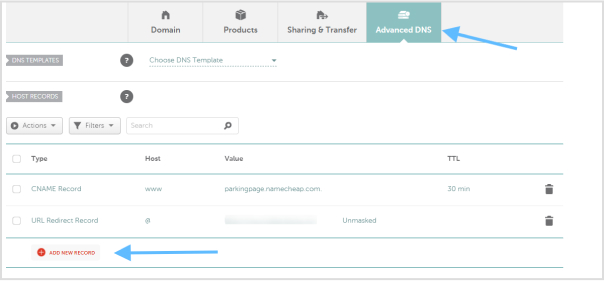
Find the option named “Add New Record” or “Add Record,” to configure the DNS settings.
Now add a CNAME record in your domain setting to configure it with your Replug account.

Click on the “Add New Record” option to include a new record. Add the following details:
- Record Type: CNAME
- Hostname: @ or www
- Point to (Address): Your short domain (URL)
Adding the DNS settings is half the equation – the next half of the process happens in your Replug dashboard.
Also read: Why your business needs a custom URL shortener?
Step 3: Add a custom domain in Replug
When the DNS setting is done, go to your Replug account to add the custom domain to your Replug account. Here’s how to do it:
1. Navigate to app.replug.io/dashboard/
2. Click on the settings icon – located in the top right corner.
3. Click “Custom Domains” from the drop-down menu.
4. Add custom domain – Enter your domain URL, 404 Redirect URL (if any), and the branded domain name.
5. Save custom domain
Play the video below to see how it’s done:
Step 4: Launch your new campaign
Once you have saved your custom domain, it’s time to create a new campaign in your Replug dashboard.
- Click “Campaigns” in the navigation bar on your Replug dashboard:

- Click the “Create new” button:

- Give your campaign an easy name to remember:

- Click “+ Connect” to connect the custom domain you created earlier (Refer to Step 2):

- Once done, simply save your campaign and you’re done!

How to easily create a custom or vanity URL?
Brands and influencers use custom URLs for promotional campaigns and discount offers to keep track of their business performance. Creating a custom URL adds a distinctive touch to your brand identity or offer. One of the benefits of using custom links is that they’re more memorable than long, generic URLs.
Let’s take a look at the steps involved in creating a custom or vanity URL if you’re not making a campaign. This process does not require you to set up a custom domain:
Step 1: Open the Replug app
The first step is to simply type in the URL of the Replug app.
Step 2: Sign in or register
There are several link management tools out there, but Replug easily lets you create a custom domain free of cost with its 14-day trial.
If you’re not already a Replug user, then sign up for an account on the Replug app here.

The best part of using this tool is that you have countless things that you can do! Some include the creation of bio links, tracking analytics, A/B testing, white-label solutions, and more.
Link Management Made Easy
Your go to link management tool for CTAs, branded and bio links, QR Codes, tracking and retargeting.
Get Started for FREE!
Step 3: Shorten your desired link
Once you sign up or log in, you’ll be directed to the main dashboard. All you have to do now is paste the URL you want to shorten in the “Enter URL to shorten” bar:


Step 4: Create your custom URL and save
Once you have pasted the long URL, you are now set to create your custom URL.
If you want to share your link on digital of social media platforms, you can add UTM parameters so that you can track your link analytics:

Otherwise, you can just click on the blue “right arrow” button to proceed further:

From here, you can simply create your custom or vanity URL by changing the URL slug.
Finally, just click the “Save Shortened Link” button to save and share your custom URL!

Track your links with Replug analytics:
Replug provides link tracking and analytics.
On your main dashboard, you’ll see the “Analytics” in the main navigation. Just click on it and you can see the detailed reports and analytics of the link you have generated and shared

7 best examples of custom or vanity URLs
We’ll look at diversified examples to make the picture crystal clear. The examples would include some top-notch brands as well as blogs or marketers that are capitalizing on the custom, short URLs.
So without any further ado, let’s get right into the examples:
1. YouTube
YouTube is the second most popular search engine on the internet. The video giant platform uses youtu.be a custom domain. When you visit youtu.be, it redirects to youtube.com.
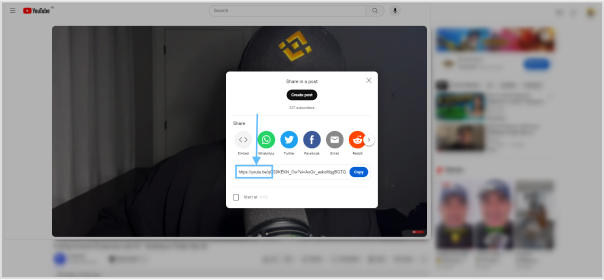
Moreover, when you share a YouTube video through the share button underneath the YouTube video, it uses the custom URL (youtu.be) for sharing the video across all platforms.
2. Amazon
Amazon is an e-commerce giant with a presence in several countries. This e-commerce retail platform uses the custom domains, such as called amzn.com and amzn.to. It showcases how well top brands understand and implement link management strategies.
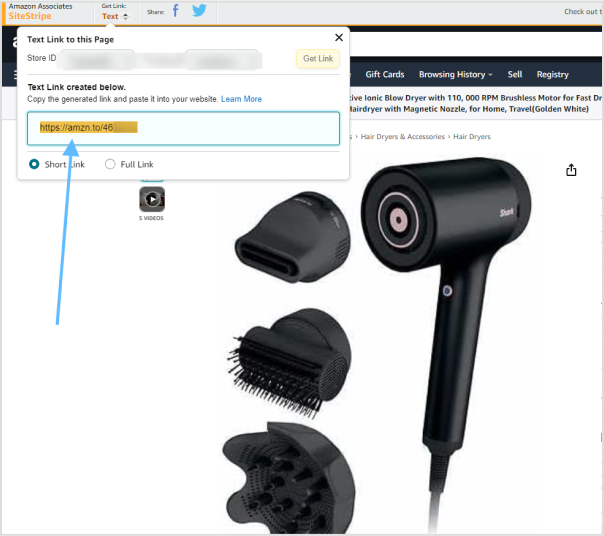
Amazon Associates members access the products’ affiliate links from SiteStripe within a second. The e-commerce giant uses amzn.to as a custom domain for affiliate products.
3. Replug
Replug is a URL shortener that comes with several link management features, such as URL shortening, UTM parameters, retargeting, deep linking, bio links, and others.
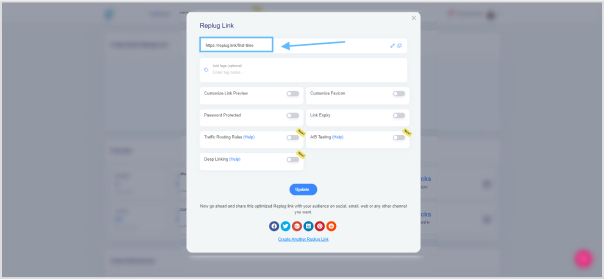
Replug’s default short URL for users is rplg.co. However, paid users could add a custom URL to their account to take their link management campaign to the next level.
4. ContentStudio
ContentStudio is an all-in-one social media management dashboard that provides brands, agencies, digital marketers, and entrepreneurs complete control over their social media management. The top features include social media scheduling, content calendar, social media analytics, and much more.
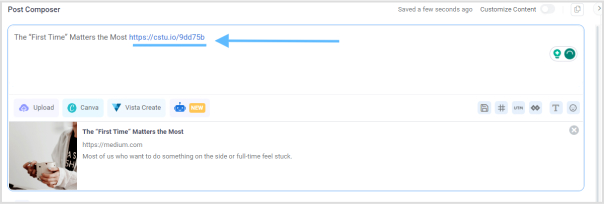
ContentStudio also uses a custom, short domain for social media content sharing – it means when users share their content on social media platforms, their long URLs get automatically shortened The platform uses cstu.io as a custom domain.
5. ShareASale
ShareASale is an affiliate marketing network that connects brands and affiliate marketers. They provide affiliate product links to the affiliates so that they can promote these products, generate sales, and earn commissions.
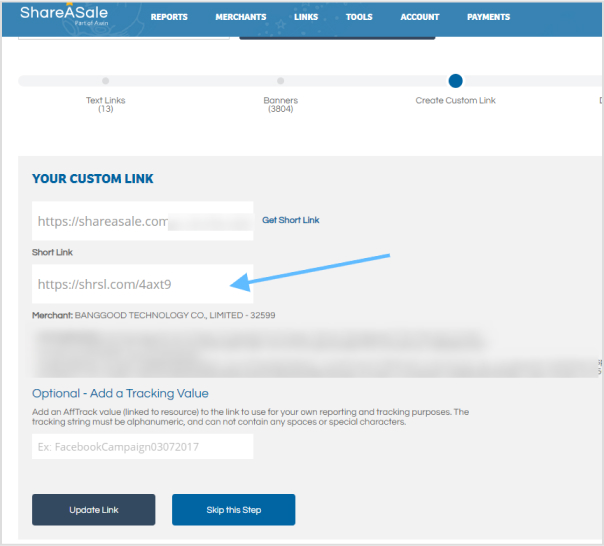
This affiliate marketing network uses shrsl.com short URL as a custom domain. The affiliates can create a custom link for any of the products from the merchant’s website.
6. SquareX
Squarex is a popular private browsing solution that is available on the web and desktop. They are using the sqrx.io as a custom domain across all social media platforms.
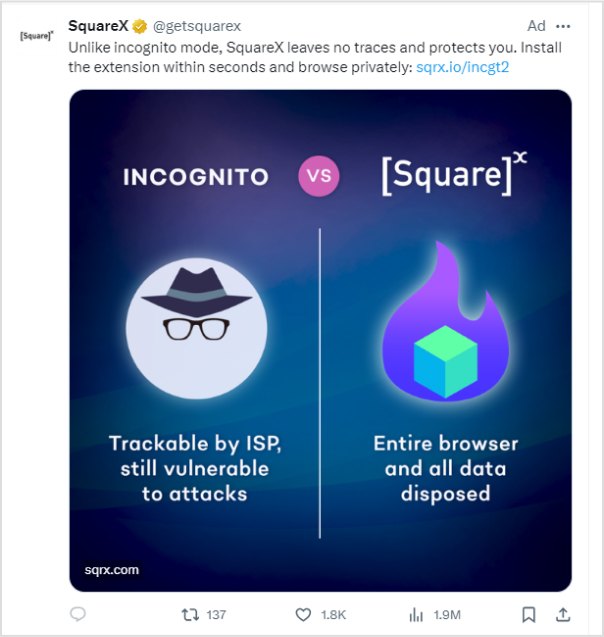
Link Management Made Easy
Your go to link management tool for CTAs, branded and bio links, QR Codes, tracking and retargeting.
Get Started for FREE!
Conclusion
So, a custom URL is a short, sweet, and branded URL that replaces the long and funky URLs and makes the URLs look better.
Custom URLs can make any digital marketing campaign look more trustworthy, professional, and appealing regardless of the marketing channel.
Professional bloggers and digital marketers use short and branded domains for social media marketing, email marketing, and paid advertising to make their social media marketing content digestible.
Now you know what custom URLs are and how brands and experts can use them.
Are you ready to try out a custom domain for your brand? Well, we’re confident that this piece will help you navigate the process of creating custom URLs for your brand.

































